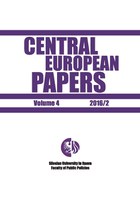The Comparison of the Czechoslovak and Hungarian Electoral Law in the Light of the Hungarian Interwar Literature
The Comparison of the Czechoslovak and Hungarian Electoral Law in the Light of the Hungarian Interwar Literature
Author(s): Gábor HollósiSubject(s): History, Law, Constitution, Jurisprudence
Published by: Slezská univerzita v Opavě, Fakulta veřejných politik
Keywords: Czechoslovak electoral law; Hungarian electoral law; Hungarian electoral law period literature; 1920s
Summary/Abstract: Based on Hungarian period literature, the study presents the main features of 1920s Czechoslovak electoral law, while comparing it to the Hungarian electoral law of the same period. Those elements of Czechoslovak electoral law are highlighted that the interwar Hungarian literature covers. Likewise, the study outlines the two differing directions which – already apparent in the first decades following the world war – the development of Czechoslovak and Hungarian electoral law had taken, despite starting out on a similar footing in the wake of independent statehood. Before drawing conclusions – with a consideration of their impact on political life – the study touches upon, in both states, the structure of the legislature, the electoral system and the distribution of seats, the conditions of active and passive suffrage law and the questions surrounding the nomination process. While in Czechoslovakia "the most mathematically precise form of proportional voting was implemented", in Hungary the admittedly manipulated electoral law ensured governability.
Journal: Central European Papers
- Issue Year: 4/2016
- Issue No: 2
- Page Range: 53-67
- Page Count: 15
- Language: English

